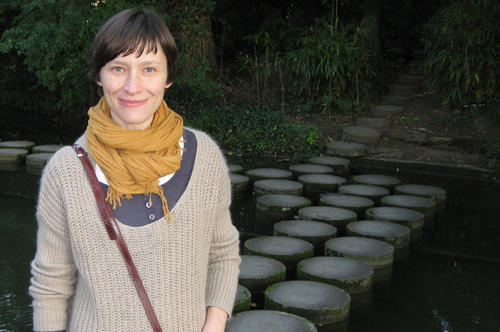Religion and Ethics
Małgorzata Rajtar, working at the medical anthropology research area at Freie Universität, studies Jehovah’s Witnesses’ refusal of blood transfusions on religious grounds
May 29, 2013
Małgorzata Rajtar does research on religion and morality. A fellow of the Alexander von Humboldt Foundation, she will be at Freie Universität until the end of the summer term.
Image Credit: Susanne Rothmund
Social and cultural anthropologist Małgorzata Rajtar, born in Gdansk, Poland, has been interested in other peoples and religious groups for a long time now. That meant it was only logical for her to begin a formal academic program in social and cultural anthropology. She did so in Warsaw, going on to earn her doctorate there in 2006. Rajtar wrote her master’s thesis on notions of the devil in Polish villages. As part of her research, she interviewed village residents rumored to be possessed by the devil or to have magical powers. “Many of the rural population’s views on the devil have hardly changed at all since the 19th century,” she says. Village residents gave her a warm welcome and even let her stay overnight at their farmhouses. “Everyone was very open. I wouldn’t have had the same kind of experience in the city. And the people in the villages also found it exciting to be interviewed,” Rajtar says. Ever since doing this field research, she has remained true to the topic of religion and ethics.
She wrote her dissertation on the understanding and interpretation of the Ten Commandments in rural areas. Once again, her field research took her to Poland’s village communities. After earning her doctorate, Rajtar took on a postdoc position at the Max Planck Institute for Social Anthropology, in the German city of Halle. As part of a research project on religion and ethics in eastern Germany, she conducted interviews in the state of Saxony. One interview in particular, with a woman in the city of Chemnitz, stood out in her memory, which turned out to have profound effects on her current research.
Now an Alexander von Humboldt fellow at the medical anthropology research area at Freie Universität Berlin, Rajtar, 36, is working on a topic that is little researched in the social sciences, but is also a sensitive one: the religiously motivated refusal of Jehovah’s Witnesses to accept blood transfusions. She arrived at this topic based on the interview with the woman in Chemnitz, who, back in the days of the former East Germany, had insisted on having surgery without a blood transfusion.
This is still a tough subject today, since – like circumcision – it touches on religion, politics, law, and culture. “For the life of the flesh is in the blood,” says the Bible (Leviticus 17:11). Jehovah’s Witnesses interpret this biblical passage and others like it as a prohibition by God on accepting blood donations – a stance that can endanger a patient’s life and pose a dilemma for doctors. There are currently more than 160,000 members of the Jehovah’s Witnesses in Germany. They do not leave home without taking an advance health care directive with them.
Since 2010, Rajtar – now an assistant professor at the university – has been back in her hometown of Gdansk, where she teaches first-semester undergraduate courses at the newly founded Institute of Social and Cultural Anthropology. The students are highly engaged, she says. Rajtar took leave from the University of Gdansk for her current research stay at Freie Universität, which will last until the end of the summer semester.
Further Information
Dr. Małgorzata Rajtar, Freie Universität Berlin, Institute of Social and Cultural Anthropology, Tel.: +49 30 838-59247, Email: mrajtar@yahoo.com

